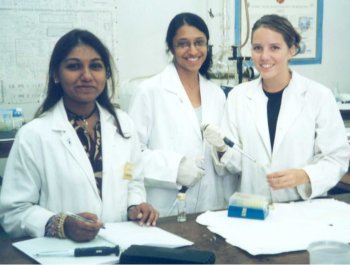Feast of modules for honours students
26 May 2002
Multiple modules: School of Biomedical Sciences honours (from left) Nishani Ramluckan, Mamta Gajjar and Ramona Allen are among the School's 35 honours students who have all benefited from a new coursework programme that offers a feast of 35 cross-disciplinary electives.
CHANGES to the honours programme in the School of Biomedical Sciences in the Health Sciences faculty have opened a new world of course choices to their honours students.
For their coursework, honours students are now able to choose from a suite of 35 cross-disciplinary electives, twice as many as in previous years. Depending on the honours course they choose (the School offers seven honours programmes: Human Genetics; Cell Biology; Medical Biochemistry; Anatomy and Anthropology; Physiology; Infectious Diseases and Immunology; and Exercise Science), students must select three discipline-specific or core courses. But as for the rest, the choice is theirs and they can explore new areas of interest in the biomedical sciences.
This year there are some 35 honours students in the School and although the development (achieved without any additional funding) has resulted in some serious co-ordination and roster planning by staff, the myriad courses mean students are able to "stretch" their boundaries, getting to know other honours students and widening their scientific horizons. "The students definitely benefit from the cross-disciplinary input," added Associate Professor Sue Kidson from the Department of Human Biology. "The staff also have more students per module and attract students from other disciplines, encouraging intellectual exchange and adding vibrancy to the classes."
In addition, the Department of Pharmacology has also come on board in making their modules available to the honours students. Another novel component of the course is the introduction of a compulsory module Scientific Communication where students meet on a regular basis to debate ethical issues, learn scientific writing, presentation skills and statistical analysis.
Kidson feels the development has enhanced the Department's honours programmes, which have also attracted postgraduate students from several African countries as far afield as Eritrea.
The students begin their course with a six-week programme where they learn the basic laboratory techniques common to the three core disciplines; molecular biology, genetics and cell biology.
The new suite of options has been received "with wide enthusiasm" even though the co-ordination of the 80 people involved has been a "mammoth" task for the master-minds, Kidson and colleague Professor Arieh Katz. Their efforts were bolstered by key role players such as Dr Jenny Ramesar of the Department of Immunology and Infectious Diseases and Toni Wiggins of the Division of Cell Biology, who, with the course co-ordinators, ensured that this six-week programme got off the ground.
The new programme has been concomitant with the launch of the Institute of Infectious Diseases and Molecular Medicine (IIDMM) and is an important development as the IIDMM will support a massive postgraduate programme," Kidson explained.
 This work is licensed under a Creative Commons Attribution-NoDerivatives 4.0 International License.
This work is licensed under a Creative Commons Attribution-NoDerivatives 4.0 International License.
Please view the republishing articles page for more information.
Related
InvestSoc at 25: advancing quality
27 Feb 2026
Prestigious global award for Prof Keertan Dheda
27 Feb 2026
NPO creates pipeline of empowered students
25 Feb 2026










